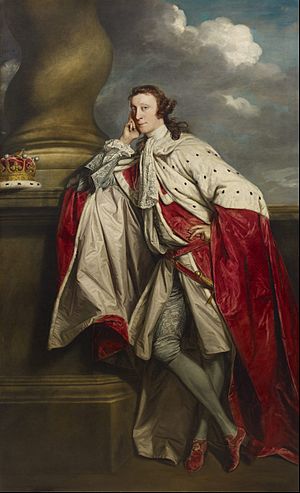James Maitland, 7th Earl of Lauderdale facts for kids
James Maitland, 7th Earl of Lauderdale (born January 25, 1718 – died August 17, 1789), was an important Scottish nobleman. He was one of the sixteen Scottish noblemen chosen to represent Scotland in the House of Lords. The House of Lords is part of the British Parliament, where laws are discussed and made.
Contents
Early Life and Army Career
James Maitland was born in 1718. He was the oldest son of Charles Maitland, who was the 6th Earl of Lauderdale. His mother was Lady Elizabeth Ogilvy.
James Maitland spent 25 years serving in the army. He became a Lieutenant-Colonel in the 16th Regiment of Foot in 1745. He later decided to leave the army when a younger officer was promoted above him.
Changes in Scottish Law
In 1746, a new law called the Heritable Jurisdictions (Scotland) Act 1746 was passed in Scotland. This law changed how land was managed. Before this, some noble families had special powers to act like judges or rulers over their lands. This law took away those powers.
Lord Lauderdale had claimed £8,000 for the loss of his powers over the areas of Thirlestane and Lauderdale. However, he only received £1,000 as payment.
Public Service and Education
James Maitland also held several important public roles. From 1766 to 1782, he was a Lord of Police. This was a position involved in the administration of public services.
He also served as the Rector of the University of Glasgow from 1779 to 1781. The Rector is a leader who represents the students and helps manage the university. Lord Lauderdale passed away at his home, Haltoun House.
Family Life and Notable Children
On April 24, 1749, James Maitland married Mary Turner. She brought a large fortune to their family. They had a big family with twelve children, six boys and six girls.
One of his sons, James Maitland, 8th Earl of Lauderdale, became very famous. He started his career interested in new ideas from France. Later, he became a leading thinker in Britain about money and how countries manage their budgets. He was one of the first to explain how having more money than you spend (a budget surplus) or spending more than you have (a budget deficit) affects a country's economy.
Another notable son was Lieutenant-General Sir Thomas Maitland. He was a high-ranking army officer. He served as a governor and commander-in-chief in places like Ceylon (now Sri Lanka), Malta, and the Ionian Islands.


